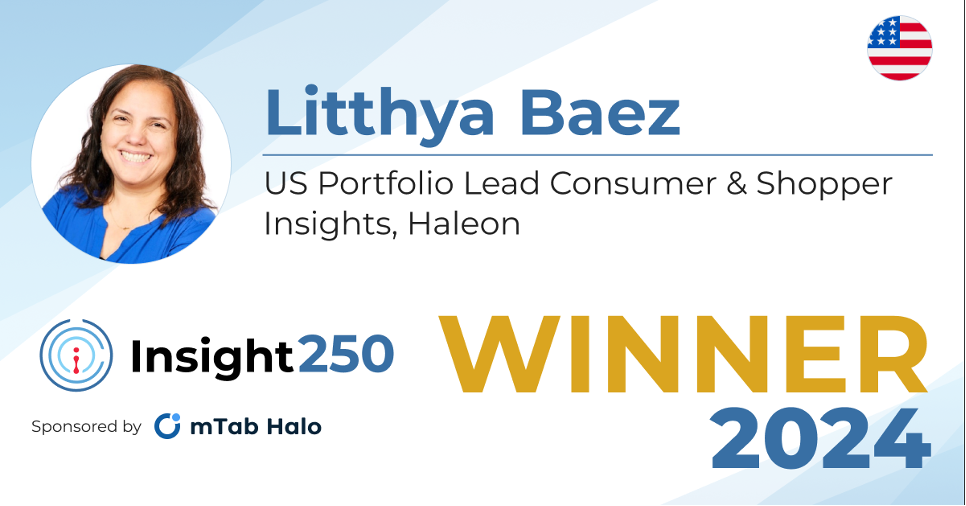Haleon’s Insight Expert on Consumer Healthcare
This edition highlights Litthya Baez, US Portfolio Lead for Consumer Insights at Haleon, who drives growth for health and wellness brands with over 20 years of experience in marketing and analytics.

Article series
Insight250
- The importance of business sense in research
- The role of humour in effective leadership
- The importance of ethics
- The importance of disruption in innovation and leadership
- The importance of Disruption in Innovation and Leadership Part 2
- The importance of Diversity & Inclusion
- The impact of colour
- Communicating insight with impact
- Insights on leadership, culture and polling
- The evolution of electric vehicles
- 2022 Top tips (part 1)
- 2022 Top tips (part 2)
- Maximising the potential of data
- The importance of flexible working
- Winners
- The importance of advanced analytics
- Judges for the 2022 Insight250 Awards announced
- The evolution from social listening to digital intelligence
- The Judges' Perspective
- The judge's perspective - part 2
- Insight Climate Collective
- Insights technology
- Understanding employee ownership
- Global insight perspectives
- Top Tips from our Leaders and Innovators
- The Evolution of Insights in the Food & Beverage Market
- The Evolution of Insights in CPG
- Neural Mechanisms Behind Consumer Decision-Making
- Celebrating and Elevating the Insights Industry
- The State of the Insights Industry
- Opportunities, challenges and threats that AI presents
- 2024 Insight250 Winners Announcement
- Connecting Brands and Consumers Through Insights
- The Importance of Human Insight and Attention
- The Elevating Role of Insights with Technology Innovation
- Haleon’s Insight Expert on Consumer Healthcare
- Insight from the Insight250: How AI is Impacting Qualitative Research
- How AI Tech is Doing the ‘Heavy Lifting’ for Insights
- Reviewing the top tips for 2025
- Google's Sarah Ashley on AI and revolutionising insights - Insights from the Insight250
- Beyond BI: The Future of Decision Intelligence for Insight Professionals
- The Advancement & Impact of Insights - An Insight250 Winners Series perspective with David Smith
- International Jury for the 2025 Insight250 Awards Announced
- Newly elected President, Anne-Sophie, on Revolutionizing the Impact of Insights
- Haleon's Litthya Baez on Enhancing Healthcare with Insights - Insight250 Winners Series
- Understanding the Insights of Consumer Decisions
- Moving Beyond Dashboards to Deliver Decisions with AI
- How AI is Transforming Insights
- How AI is Transforming Insights
- Five Years of Insight250: Elevating the Insight Industry
The Insight250 spotlights and celebrates 250 of the world’s premier leaders and innovators in market research, consumer insights, and data-driven marketing. The awards have created renewed excitement across the industry whilst strengthening the connectivity of the market research community. Winners of the 2024 Insight250 were announced this past September - you can see the full list of Winners at Insight250.com.
With so many exceptional professionals named to the Insight250, it seems fitting to tap into their expertise and unique perspectives across various topics. This regular series does just that: inquiring about the expert perspectives of many of these individuals in a series of short topical features.
This edition features Litthya Baez. As the US Portfolio Lead Consumer & Shopper Insights at Haleon, Litthya provides insights for leading health and wellness brands to drive growth. With over 20 years of management experience in multinational companies, she has a proven track record of delivering strategic marketing, consumer/shopper insights, market analytics, and category management.
I sat down with Litthya to discuss a spectrum of topics from the evolving role of insights to technology innovation and how these advancements are enhancing the healthcare industry.
Crispin: How critical is customer insight for global brands like Haleon in today’s market?
LB: “Insights are more critical than ever for Haleon. As a new OTC-only company, deeply understanding our consumers as people is paramount. We need to move beyond superficial questions (“do you like this claim and why?”) to gaining an intimate knowledge of who they are, what makes them tick, and what drives or hinders their health. Only then can we deliver solutions that truly delight them. Deep Human Understanding is one of the anchors of our strategy, which makes me very happy.
Crispin: Is using insights to drive commercial decisions increasing or decreasing in the sector, and why do you think that is happening?
LB: “I notice an increased utilization of insights in various instances. Our retailers are posing significant questions that demand well-informed answers. They are asking about the impact of broad issues like the role of the economy in our industry or the dynamics behind OTC benefits. What excites me the most is connecting these trends with our “daily jobs”: we provide a perspective on what’s happening and brainstorm solutions for the people we serve. This is where I see the evolution: continuously driving the connection between insights and activations, regularly impacting everyone’s day-to-day tasks.”
Crispin: “What are the key challenges facing insights professionals in 2025?
LB: “Like everything in life, a good thing used in excess can become a bad thing. There is an increased reliance on ‘quick and dirty’ research or generative AI. While these tools are phenomenal and save us significant time, we need to exercise our expertise as insight strategists. This means looking at the many ways a question can be answered, finding the question behind the question, understanding the foundational dynamics driving the question, and choosing how to answer them appropriately. I don’t believe killing a mosquito with a bazooka, so not every question needs multiple layers of complicated research. However, some strategic questions will require our strategic acumen to provide strategic answers. And by all means, use the tools and tech as enablers of your journey!”
Crispin: Does increased competition and a changing customer base influence how consumer health brands gather insights?
LB: “Oh, absolutely. We can no longer rely solely on our brand recognition and credentials to keep our consumers engaged. New competitors are entering already crowded categories, offering attributes that consumers have been seeking but not finding in established brands. The people we serve are more knowledgeable, less trusting, and have numerous tools at their disposal to make decisions. While not every “hack” posted on social media is accurate, when it becomes a primary source of information, brands must play a significant role in reassuring consumers, educating them reliably, and providing solutions that meet their needs. In one word: we need to delight them now more than ever.”
Crispin: Has the profile of Haleon’s customers evolved over the last decade, and what factors do you believe are driving these changes? Does this impact the insights process?
LB: “Our consumers and customers have indeed evolved. Society has changed not only demographically, but attitudinally. Technology has made giant leaps, enabling more informed shoppers who are also more overwhelmed by all the choices. We live in at least two different realities, and access to products varies greatly. We are now more aware of our cultural differences, which I view positively. As our many cultures come together, we will have a society that learns to acknowledge our differences without feeling like they are walking on eggshells, and I look forward to that. As a result of these changes, insights must be more inclusive, considering demographics, different abilities, and varying levels of income and access. We need to be more deliberate about avoiding cookie-cutter approaches, challenging sample composition, and driving change in this area.”
Crispin: Do you think Haleon will use AI in the insights process?
LB: “We are already leveraging the numerous benefits of AI, especially generative AI. It’s an incredibly useful tool for quickly identifying themes in sea of resources, tweaking stimuli, creating and optimizing discussion guides and surveys, creating personas and starting to engage in conversations with them. And I believe we’re only scratching the surface! I’m very excited about the potential value these tools can bring to our strategic insights journey.”
Crispin: What role do insights play in attracting new customers and moving them from occasional customers to regular users and even brand advocates?
LB: “Wow, that’s the million-dollar question! I was going to ask if you knew how to do this… any pointers would be helpful! In all seriousness, though, insights are crucial for helping our teams stay alert to new learnings. Sometimes our colleagues have a specific hypothesis in mind and seek confirmation (or lack thereof). When we start at a more human level, themes begin to emerge: it’s no longer yes/no/why, but also who are you, what motivates you, and what hinders your purchase, adherence, or consideration. When we approach our people with an open mind, that’s when the magic happens. If we truly listen, we can address their concerns, opening a window to create solutions that work for them. Who wouldn’t return to a brand that understands their needs, provides solutions at an acceptable cost, and is constantly evolving?”
Crispin: Can you provide an example of a key insight that fundamentally changed a product decision or marketing strategy at Haleon? How do you ensure such insights are effectively communicated and implemented across various departments?
LB: “Without going into too much depth due to its confidential nature, we have embarked on a journey to understand, embrace, and leverage our Demand Spaces framework. It has truly been transformational to the way we do business! It has been quite a journey. As you can imagine, foundational insights are a marathon, not a sprint. Embedding these insights is as important as the research itself, and this process takes consistency, a desire to support and coach the teams, and a whole lot of perseverance. But I’m happy to say that we have reached a point where our strategies align with why and how people engage with health and wellness occasions. It’s been one of the highlights of my career!”
HOT TOPIC: Overcoming industry-wide challenges to deliver results.
LB: “In a post COVID world, many teams have reduced resources yet need to achieve more. Often marketing teams and others are hungry for data and attempt to conduct research or analyse data independently - sometimes misinterpreting or incorrectly analysing data. Others are faced with growing and siloed data sets, tools that are no longer fit for purpose - we are in a world where insights and evidence are more important yet results are need more quickly. Taken four of these areas below, how does a leading global brand such as Haleon tackle this challenge?
(a) Overcoming Research Team Resource Constraints and Disconnected Tools: How does Haleon address the challenges posed by limited research team resources and the use of disconnected analysis and reporting tools that can create delays or inefficiencies in obtaining insights?
It’s a work in progress! We are tapping into AI, and optimizing the places where our research is housed, so we can always get to existing learnings without spending hours on it. But I acknowledge that we have much work to do in this area! We are introducing some cool features and tools that our teams have developed tapping into emerging search tech, so I’m excited about the future.
(b) Overcoming Siloed Survey Data: What strategies or technologies does Haleon employ to integrate siloed survey data, ensuring that valuable insights are not missed and can be leveraged effectively across different departments?
That’s another area where we are learning and growing. We are learning how to integrate AI into our research journey so we can tap into existing information throughout the organization. This is where GenAI tools are providing tremendous value and saving us time!
(c) Addressing Limitations of Dashboards and Complex Survey Analysis Tools: How does Haleon overcome the challenges posed by high-level dashboards and complex survey analysis tools that restrict the ability to obtain deep insights quickly and independently? I wish I could give you a better answer, but I don’t have a ton of information on this one.
(d) Managing Data and Insights Enterprise-Wide: How does Haleon manage data and insights enterprise-wide to ensure that teams have access to accurate information while preventing misuse or misinterpretation of the data?
There is always going to be the tension between democratizing insights and the risk of misuse. The good news is that our teams have access to resources and existing research, and they know who to contact when they have questions. We have really strong partnerships with our commercial teams, and they come to us for advise regularly.”
TOP TIP
“I would say, bring your true self to the role. Be the same person you are when you’re having coffee with a friend. Authenticity and passion are critical qualities that our corporations are hungry to see in us. If we care for the people we serve and want our team to succeed in delighting them, that’s a great start. However, these two objectives are not always aligned. As a result, you have to be the voice of those who can’t be at the meeting with us but are speaking loudly.
Also, don’t be afraid to trust your experience. Look for simplicity and efficiency: if we can avoid overdoing or underdoing it, we are golden. Lean into your inner insights strategist and try to find the question behind the question: what do we want to accomplish? What’s the strategic objective? Have we looked at our existing information (like, really looked)? Don’t research because someone wants it done… it must feel right to you. If it doesn’t, find out why – you might be onto something.”
Crispin: Litthya, thank you for providing such a fascinating perspective into the role insights play for the complex world of consumer OTC healthcare. The ever-expanding role of insights seems to be creating exciting opportunities across an array of industries, so getting your front-row perspective is fantastic. It’s fascinating to see how advancing innovations, like AI, are changing and challenging the world of market research, so the coming years should represent exciting times for all of us in the profession.

Crispin Beale
Chairman at QuMind, CEO at Insight250, Senior Strategic Advisor at mTab, CEO at IDXCrispin Beale is a marketing, data and customer experience expert. Crispin spent over a decade on the Executive Management Board of Chime Communications as Group CEO of leading brands such as Opinion Leader, Brand Democracy, Facts International and Watermelon. Prior to this Crispin held senior marketing and insight roles at BT, Royal Mail Group and Dixons. Crispin originally qualified as a chartered accountant and moved into management consultancy with Coopers & Lybrand (PwC). Crispin has been a Board Director (and Chairman) of the MRS for nearly 20 years and UK ESOMAR Representative for c15 years. As well as being CEO of Insight250, Crispin is currently Worldwide CEO of Digital Communications Solution Agency, IDX. Crispin is also the Senior Strategic Advisor at mTab and the Chairman of QuMind and spent 4 years as Group President of Behaviorally where he was responsibile for the client & commercial teams globally. Crispin is a passionate advocate for blending human intelligence and technology to deliver innovation and leadership across organisations.
Article series
Insight250
- The importance of business sense in research
- The role of humour in effective leadership
- The importance of ethics
- The importance of disruption in innovation and leadership
- The importance of Disruption in Innovation and Leadership Part 2
- The importance of Diversity & Inclusion
- The impact of colour
- Communicating insight with impact
- Insights on leadership, culture and polling
- The evolution of electric vehicles
- 2022 Top tips (part 1)
- 2022 Top tips (part 2)
- Maximising the potential of data
- The importance of flexible working
- Winners
- The importance of advanced analytics
- Judges for the 2022 Insight250 Awards announced
- The evolution from social listening to digital intelligence
- The Judges' Perspective
- The judge's perspective - part 2
- Insight Climate Collective
- Insights technology
- Understanding employee ownership
- Global insight perspectives
- Top Tips from our Leaders and Innovators
- The Evolution of Insights in the Food & Beverage Market
- The Evolution of Insights in CPG
- Neural Mechanisms Behind Consumer Decision-Making
- Celebrating and Elevating the Insights Industry
- The State of the Insights Industry
- Opportunities, challenges and threats that AI presents
- 2024 Insight250 Winners Announcement
- Connecting Brands and Consumers Through Insights
- The Importance of Human Insight and Attention
- The Elevating Role of Insights with Technology Innovation
- Haleon’s Insight Expert on Consumer Healthcare
- Insight from the Insight250: How AI is Impacting Qualitative Research
- How AI Tech is Doing the ‘Heavy Lifting’ for Insights
- Reviewing the top tips for 2025
- Google's Sarah Ashley on AI and revolutionising insights - Insights from the Insight250
- Beyond BI: The Future of Decision Intelligence for Insight Professionals
- The Advancement & Impact of Insights - An Insight250 Winners Series perspective with David Smith
- International Jury for the 2025 Insight250 Awards Announced
- Newly elected President, Anne-Sophie, on Revolutionizing the Impact of Insights
- Haleon's Litthya Baez on Enhancing Healthcare with Insights - Insight250 Winners Series
- Understanding the Insights of Consumer Decisions
- Moving Beyond Dashboards to Deliver Decisions with AI
- How AI is Transforming Insights
- How AI is Transforming Insights
- Five Years of Insight250: Elevating the Insight Industry


